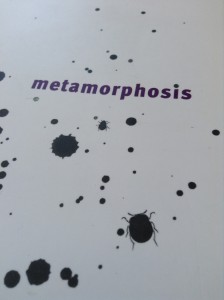
So you wake up one morning, and you’ve become a bug. You’re flailing on your back, the bedroom door is locked, and you’re really worried: you’ve missed not just one, but two early trains to work.
You may well recognise this as the opening sequence of Franz Kafka’s novella Metamorphosis. I didn’t. I only picked the book up because I saw Andy Griffiths (of The Day My Bum Went Psycho fame) on the telly, calling Metamorphosis “as close to perfect a piece of fiction as you could possibly want”. It looked very nice on my shelf—and gave me that satisfying feeling of reading something rather highbrow, without actually opening it. And then I got the overdue notice from the library, and figured, all right. Just a quick peek before I return it.
I was hooked. Metamorphosis is fantastic—clever, sad, funny, a bit gross, beautifully ironic. And not difficult. I was drawn in to the world of Gregor Samsa, a young man who works hard at a job he doesn’t like in order to support his family. By the end of the first paragraph, I was totally on board with the bug transformation, and eager to see how it was all going to pan out.
Now as they pointed out on the The Book Club, there have been thousands of books written about Metamorphosis. Lots of them will be by clever literary types who have read all these other books, and can give you a summary of global scholarship on the subject. I’m not in a position to do that. What I want to do is talk a bit about how Metamorphosis makes everyday life just the right amount of strange—forcing us into a double-take, so we look at things afresh, and recognise them again. This, incidentally, is one definition of that fancy-sounding word, Kafkaesque: something familiar, but also strange.[1]
To me, this attitude is the whole point of reading. It flexes the part of your brain that says: am I happy? Do I need to do things this way? Should I really be eating meat/unethically fished tuna? Do I even like this? Or whatever. It’s important to step into those gaps sometimes, and think. The rest of the time, we rely on everything obvious, and unsaid. Because that’s how we look after ourselves, and the people around us. We use what we know.
So when Kafka gives Gregor bug legs and antenna, we see a dutiful son in a strange (yet familiar) light. Gregor is stuck in bed, unable to answer the worried cries of his family—and one of his chief concerns is that he’s slept through the alarm. He’s missed the 6am train, and will soon miss the next one, too. Waving his little bug legs, he convinces himself he might be able to go to work anyway—that somehow, he’ll explain it all to his boss. He has to keep his job, and he knows he must get up, since “in bed … his meditations could come to no sensible conclusion.”
On the one hand, this scene is genuinely funny—here’s a guy who’s just turned into a bug, and he’s worried about getting to work? He thinks that getting up will solve his problems? But of course we see that in the daily course of his (pre-bug) life, these acts have been the answer. To love my family, I must work. To be myself, I must continue. Going on is what matters.
In this light, the central metamorphosis isn’t the one that turns Gregor into a bug. It’s the changes that take place within Gregor after he’s an insect. When we first meet Gregor, he’s a bug who feels human on the inside. As he adjusts to his new body, his senses and tastes change. He feels moments of sad rebellion, and dreams of a life outside his locked room. But there would be no fascination in the story if Gregor transformed inexorably into an insect: the drama is in his struggle to find his new self in these changed circumstances.
This is a theme we can all relate to. Well, not the bug part—but the idea that we have to adjust to what the world (our families, jobs, social status, random chance) asks of us. Sometimes, this coincides with our deepest wishes (such as looking after our loved ones); sometimes, it doesn’t (as when Gregor finds himself working long hours, or turned into a bug). But just as Gregor’s new body is not simply a uniform that he can take off, the roles we take on—and the choices we make—become part of who we are. In Gregor’s case, this is both sadly ironic (worrying about catching a train when he can’t roll his bug body out of bed) and a kind of shrug-your-shoulders status quo (noticing that he’s repulsed by fresh food, and attracted to garbage). Yet all through these changes, we’re reading along with the same Gregor. I think this goes to what scholars call Kafka’s notion of ‘indestructibility’: “a going on when you can’t go on”.[2] We adapt, we work hard to do what’s required—and somehow, we remain ourselves.
In turning Gregor into a bug, Kafka opens up a chink in reality; another angle for peering at the world. And although nearly a century has passed since Gregor’s story was published, the characters are as real and recognisable as someone you’d meet on a bus (or indeed, over Christmas dinner). The weirdness of Gregor’s situation is enough to make us pause and do a double-take: and while we’re looking, perhaps find some everyday strangeness of our own.